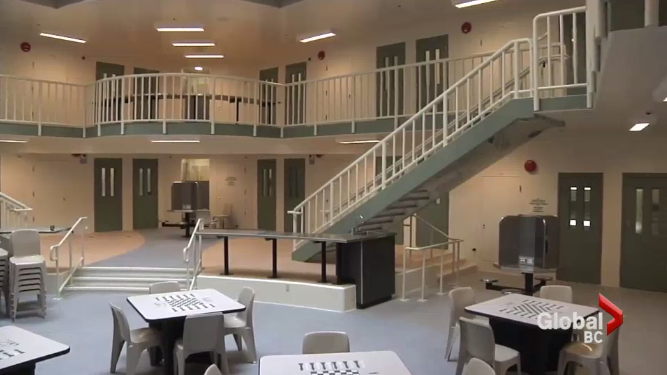Body scanners are now being used in four B.C. correctional facilities to prevent inmates from smuggling drugs.

The equipment is a part of a pilot project aimed at keeping inmates away from contraband substances like fentanyl, and to protect corrections officers from being exposed to drugs during pat downs.
Full-body scanners have now been installed at the Surrey Pretrial Services Centre, North Fraser Pretrial Centre, Alouette Correctional Centre for Women and the Okanagan Correctional Centre.
BC Corrections said the locations were ideal places to test the equipment because the four facilities see a higher volume of inmates moving in and out of custody than other centres.
Dean Purdy, vice-president of corrections and sheriffs services for the B.C. Government and Service Employees’ Union (BCGEU), said the new gear is a game changer.
“It picks up ceramics, drugs, everything that could be inside someone’s body,” he said.

Get weekly health news
WATCH: Alberta corrections officers increasingly at risk of exposure to fentanyl

Ontario installed similar full body scanners in all of its jails in 2016, becoming the first Canadian province to do so.
The move came as the province grapples with a growing number of inmate overdoses, Purdy said.
“It’s happening on a semi-regular basis, where we have drug overdoses,” Purdy said. “Our officers are responding to medical emergencies all the time.”
In response to that claim, BC Corrections said there have been no confirmed cases of staff being exposed to fentanyl or other high-potency narcotics.
The pilot project will cost the province $640,000, and BC Corrections said its effectiveness will be assessed over the next several months before a decision is made on whether to expand the initiative to other facilities.
- Shooting at Rhode Island ice rink kills 2 during youth hockey game: police
- Anti-feminist ideology ‘increasingly relevant’ to national security: CSIS
- Savannah Guthrie issues new plea for mother’s return as police clear family
- Tumbler Ridge shooting fuels misinformation about trans people, organization says













Comments
Want to discuss? Please read our Commenting Policy first.